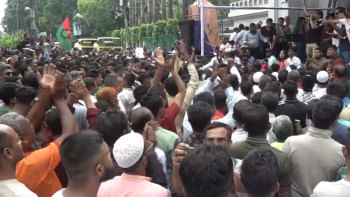Restoration of democracy can lead to resolution of Rohingya crisis: Fakhrul

BNP Secretary General Mirza Fakhrul Islam Alamgir today sought cooperation from the international community in restoring democracy and voting rights of people in Bangladesh and linked it to a resolution of the Rohingya crisis.
Speaking at a seminar focused on solutions to the Rohingya issue, Fakhrul reasoned that an elected-time government armed with the people's mandate is necessary for resolving the longstanding Rohingya crisis, as it would enjoy the credibility to work most effectively with the international community.
"This crisis [lack of democracy] doesn't just affect BNP - it's now the biggest problem in Bangladesh. No greater crisis has ever come before. I can't speak, can't get justice, security, healthcare, education...it can't be," the BNP leader said.
Referring to a report in the New York Times, he said the newspaper clearly depicted how democratic rights of the people of Bangladesh are being taken away slowly, secretly, and silently.
"Through this seminar, I request all international organisations, global community, and also the people to stand by the side of the people of Bangladesh to restore democracy and voting rights," Fakhrul said.
BNP organised the seminar titled, "Rohingya Crisis and Repatriation Strategy", at a city hotel, where its Standing Committee Member Amir Khosru Mahmud Chowdhury presented the keynote.
On the Rohingya crisis, Fakhrul said BNP would resolve the problem with the help of the global community once it is elected by the people's votes.
He said that the Awami League government cannot raise its voice internationally about the Rohingya crisis since it lacks people's mandate. "So, the Rohingya problem cannot be resolved unless this government is removed."
The BNP leader said they organised the seminar on the Rohingya issue as they are worried over the repeated incidents of violence and firing occurring in the camps in Cox's Bazar, that house some 1.1 million Rohingya refugees from Myanmar.
"We are worried whether extremism is emerging from there, whether a violent situation is being created in the country again," the BNP secretary general said.
In his keynote speech, Khosru said, "We firmly believe that the ongoing humanitarian tragedy demands sustainable and meaningful action. The continued lack of progress in repatriating the Rohingya community, despite six years having passed since the genocidal clearance operation, is deeply concerning and unacceptable. The fact remains that not a single Rohingya refugee could be repatriated till date."
After a failed repatriation agreement in 2017, he said Myanmar has now agreed to accept the return of 1,176 Rohingyas under a new agreement, to what the Myanmar junta claims are model villages in Maungdaw township, as part of a pilot repatriation project.
"We perceive this new repatriation attempt as a trap, which will only perpetuate the persecution faced by one of the world's forgotten minorities," Khosru said.
He recounted that BNP had dealt with the Rohingya crisis twice, during its tenures in the late 1970s and early 1990s. "On both occasions, our party succeeded in creating remarkable diplomatic pressure upon the Myanmar military regimes to repatriate the Rohingyas."
"Should BNP assume power, resolving the Rohingya crisis will be our top national and foreign policy priority, focusing on finding a permanent solution to this complex crisis," Khosru said.
He also said a legitimate government armed with the people's mandate, accountable to the people, is a must to engage all the international stakeholders to ensure a permanent solution to the crisis.

 For all latest news, follow The Daily Star's Google News channel.
For all latest news, follow The Daily Star's Google News channel. 



Comments